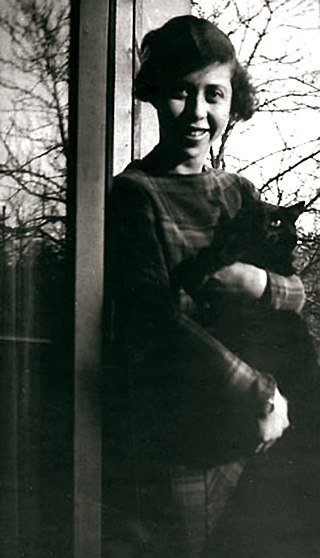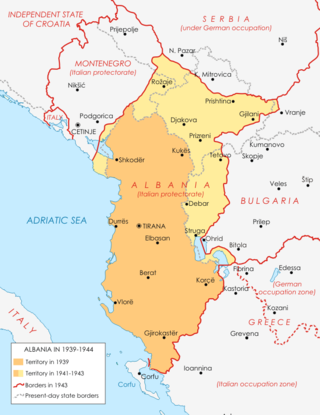
During World War II, some individuals and groups helped Jews and others escape the Holocaust conducted by Nazi Germany.

Irena Stanisława Sendler (née Krzyżanowska), also referred to as Irena Sendlerowa in Poland, nom de guerreJolanta, was a Polish humanitarian, social worker, and nurse who served in the Polish Underground Resistance during World War II in German-occupied Warsaw. From October 1943 she was head of the children's section of Żegota, the Polish Council to Aid Jews.
Anti-Slavic sentiment, also called Slavophobia, refers to prejudice, collective hatred, and discrimination directed at the various Slavic peoples. Accompanying racism and xenophobia, the most common manifestation of anti-Slavic sentiment throughout history has been the assertion that Slavs are inferior to other peoples. This sentiment peaked during World War II, when Nazi Germany classified Slavs— especially the Poles, Russians, Belarusians and Ukrainians—as "subhumans" and planned to exterminate a large number of them through the Generalplan Ost and Hunger Plan. Slavophobia also emerged twice in the United States: the first time was during the Progressive Era, when immigrants from Eastern Europe were met with opposition from the dominant class of Western European–origin American citizens; and again during the Cold War, when the United States became locked in an intensive global rivalry with the Soviet Union.

The Kraków Ghetto was one of five major metropolitan Nazi ghettos created by Germany in the new General Government territory during the German occupation of Poland in World War II. It was established for the purpose of exploitation, terror, and persecution of local Polish Jews. The ghetto was later used as a staging area for separating the "able workers" from those to be deported to extermination camps in Operation Reinhard. The ghetto was liquidated between June 1942 and March 1943, with most of its inhabitants deported to the Belzec extermination camp as well as to Płaszów slave-labor camp, and Auschwitz concentration camp, 60 kilometres (37 mi) rail distance.

Simon Wiesenthal was a Jewish Austrian Holocaust survivor, Nazi hunter, and writer. He studied architecture, and was living in Lwów at the outbreak of World War II. He survived the Janowska concentration camp, the Kraków-Płaszów concentration camp, the Gross-Rosen concentration camp, a death march to Chemnitz, Buchenwald, and the Mauthausen concentration camp.

The history of the Jews in Romania concerns the Jews both of Romania and of Romanian origins, from their first mention on what is present-day Romanian territory. Minimal until the 18th century, the size of the Jewish population increased after around 1850, and more especially after the establishment of Greater Romania in the aftermath of World War I. A diverse community, albeit an overwhelmingly urban one, Jews were a target of religious persecution and racism in Romanian society from the late-19th century debate over the "Jewish Question" and the Jewish residents' right to citizenship, to the genocide carried out in the lands of Romania as part of the Holocaust. The latter, coupled with successive waves of aliyah, has accounted for a dramatic decrease in the overall size of Romania's present-day Jewish community.

Jewish resistance under Nazi rule took various forms of organized underground activities conducted against German occupation regimes in Europe by Jews during World War II. According to historian Yehuda Bauer, Jewish resistance was defined as actions that were taken against all laws and actions acted by Germans. The term is particularly connected with the Holocaust and includes a multitude of different social responses by those oppressed, as well as both passive and armed resistance conducted by Jews themselves.
In World War II, many governments, organizations and individuals collaborated with the Axis powers, "out of conviction, desperation, or under coercion." Nationalists sometimes welcomed German or Italian troops they believed would liberate their countries from colonization. The Danish, Belgian and Vichy French governments attempted to appease and bargain with the invaders in hopes of mitigating harm to their citizens and economies.

Irène Némirovsky was a novelist of Ukrainian Jewish origin who was born in Kiev, then in the Russian Empire. She lived more than half her life in France and wrote in French, but was denied French nationality. Arrested as a Jew under the racial laws – which did not take into account her conversion to Roman Catholicism – she was murdered in Auschwitz at the age of 39. Némirovsky is best known for the posthumously published Suite française.
Peter Zinovieff was a British composer, musician and inventor. In the late 1960s, his company, Electronic Music Studios (EMS), made the VCS3, a synthesizer used by many early progressive rock bands such as Pink Floyd and White Noise, and Krautrock groups as well as more pop-orientated artists, including Todd Rundgren and David Bowie. In later life, he worked primarily as a composer of electronic music.
Sofka Zinovieff is a British author and journalist.

Marie-Claude Vaillant-Couturier was a French Resistance member in World War II as well as a photojournalist, deported to Auschwitz in 1943. She survived the war and became a Communist politician, elected to Parliament under the Fourth and Fifth Republic.

The history of the Jews in Kosovo largely mirrors that of the history of the Jews in Serbia, except during the Second World War, when Kosovo, as part of Kingdom of Albania, was under Italian control and later under German control. The other exception is following the Kosovo War of 1999, when the province began its political separation from Serbia.

Numerous internment camps and concentration camps were located in France before, during and after World War II. Beside the camps created during World War I to intern German, Austrian and Ottoman civilian prisoners, the Third Republic (1871–1940) opened various internment camps for the Spanish refugees fleeing the Spanish Civil War (1936–1939). Following the prohibition of the French Communist Party (PCF) by the government of Édouard Daladier, they were used to detain communist political prisoners. The Third Republic also interned German anti-Nazis.
A number of Arabs and Muslims participated in efforts to help save Jewish residents of Arab lands from the Holocaust while fascist regimes controlled the territory. From June 1940 through May 1943, Axis powers, namely Germany and Italy, controlled large portions of North Africa. Approximately 1 percent of the Jewish residents, about 4,000 to 5,000 Jews, of that territory were murdered by these regimes during this period. The relatively small percentage of Jewish casualties, as compared to the 60 percent of European Jews who were murdered during the Holocaust, is largely due to the successful Allied North African Campaign and the repelling of the Axis powers from North Africa.

Mary Berg was a survivor of the Warsaw Ghetto and author of a Holocaust diary, which contains her personal journal entries written between October 10, 1939, and March 5, 1944, during the occupation of Poland in World War II.

The Holocaust in Belgium was the systematic dispossession, deportation, and murder of Jews and Roma in German-occupied Belgium during World War II. Out of about 66,000 Jews in the country in May 1940, around 28,000 were murdered during the Holocaust.

The Holocaust in Albania consisted of crimes committed against Jews in Albania while Albania was under Italian and German occupation during World War II. Throughout the war, nearly 2,000 Jews sought refuge in Albania-proper. Most of these Jewish refugees were treated well by the local population, despite the fact that Albania-proper was occupied first by Fascist Italy, and then by Nazi Germany. Albanians often sheltered Jewish refugees in mountain villages and transported them to Adriatic ports from where they fled to Italy. Other Jews joined resistance movements throughout the country.

Robert Vernon Heber-Percy, known for much of his life as "the Mad Boy", was "an English eccentric in the grand tradition".
Princess Sofia Alekseevna Dolgorukova, née Countess Bobrinskaya, was a Russian surgeon, pilot and racing driver. Daughter of Aleksei Aleksandrovich Bobrinsky. She was one of the first female racing drivers and pilots in the Russian Empire and the world. She served as a pilot in the First World War after the Russian Provisional Government had allowed women to serve in warfare in 1917. Sofka Skipwith was her daughter.















